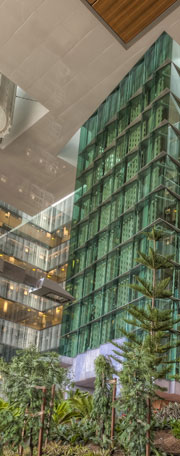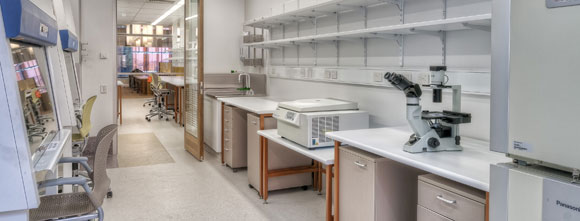APCRC-Q moves into high-tech Translational Research Institute Building
Team work key to smooth relocation
Team work and excellent logistical organisation contributed to the success of the move which saw researchers able to continue their work in the new laboratories within days of arriving at the new site.
The move took place in two stages with researchers from the PA Hospital site moving across in late December and their colleagues from Kelvin Grove Campus joining them in mid-January.

TRI provides unique collaborative opportunities

The new seven-storey, 32,000-square-metre TRI building comprises five floors of laboratory research plus facilities for research support, administration, and teaching. Providing researchers with access to state-of-the-art equipment, and hence offering the capability to develop new therapeutic technologies and take these from the laboratory through to clinical and commercial development.
“TRI brings together the collective intellect of over 650 researchers from the University of Queensland, the Queensland University of Technology, Mater Research and Princess Alexandra Centres for Health Research to discover, produce, test and manufacture new treatments and vaccines in one location,” said Minister for Science and Innovation, Ros Bates, after conducting a site tour of the facility on 10 January 2013.
This is an Australian first, with four of the country’s pinnacle research facilities working together to improve and accelerate medical research and translate that research into improved patient care.
The Institute combines academic medicine and translational research, in order to minimise the time between a laboratory discovery and its effective application in the clinic and the community.
“The strong focus on rapid translation of research into clinical and commercial application aligns perfectly with the Australian Prostate Cancer Research Centre - Queensland’s vision to develop new therapeutics and predictive biomarkers, via a collaborative, trans-disciplinary, translational approach,” said Prof Colleen Nelson, APCRC-Q’s Executive Director.
“Local, national, and international collaborations are at the heart of our research activities, and in the TRI we have an excellent opportunity work closely with our fellow researchers across a broad spectrum of interrelated areas,” she added.
Prof Judith Clements, Scientific Director of APCRC-Q and Head of the IHBI’s Cancer Program, is also enthusiastic about the move.
“This move greatly facilitates the QUT Cancer Program’s efforts to gain a better understanding of the molecular and cellular basis for the development and progression of cancers, such as prostate, breast, ovary, endometrial and lung,” she said.







